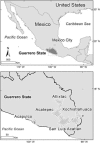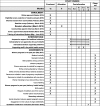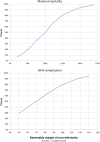Safe Birth and Cultural Safety in southern Mexico: study protocol for a randomised controlled trial
- PMID: 29973241
- PMCID: PMC6033215
- DOI: 10.1186/s13063-018-2712-6
Safe Birth and Cultural Safety in southern Mexico: study protocol for a randomised controlled trial
Abstract
Background: Indigenous women in the southern Mexican state of Guerrero face poor maternal health outcomes. Living as they do at the very periphery of the Western health system, they often receive low-quality care from health services that lack human and financial resources. Traditional health systems remain active in indigenous communities where traditional midwives accompany women through motherhood. Several interventions have explored training birth attendants in Western birthing skills, but little research has focussed on supporting traditional midwives by recognising their knowledge. This trial supports traditional midwifery in four indigenous groups and measures its impact on maternal health outcomes.
Methods: The study includes four indigenous populations in the State of Guerrero (Nahua, Na savi/Mixteco, Me'phaa/Tlapaneco and Nancue ñomndaa/Amuzgo), covering approximately 8000 households. A parallel-group cluster-randomised controlled trial will compare communities receiving usual care with communities where traditional midwives received support in addition to the usual care. The intervention was defined in collaboration with participants in a 2012 pilot study. Supported midwives will receive a small stipend, a scholarship to train one apprentice, and support from an intercultural broker to deal with Western health personnel; additionally, the health staff in the intervention municipalities will participate in workshops to improve understanding and attitudes towards authentic traditional midwives. A baseline and a final survey will measure changes in birth and pregnancy complications (primary outcomes), and changes in gender violence, access to healthcare, and engagement with traditional cultural activities (secondary outcomes). The project has ethical approval from the participating communities and the Universidad Autónoma de Guerrero.
Discussion: Indigenous women at the periphery of Western health services do not benefit fully from the attenuated services which erode their own healthcare traditions. Western health service providers in indigenous communities often ignore traditional knowledge and resources, inadvertently or in ignorance, disrespecting indigenous cultures. Improved understanding between midwives and the official healthcare system can contribute to more appropriate referral of high-risk cases, improving the use of scarce resources while lowering costs of healthcare for indigenous families.
Trial registration: ISRCTN12397283 . Retrospectively registered on 6 December 2016.
Keywords: Aboriginal health; Cultural safety; Epidemiology; Equity in access; Randomised Controlled Trial; Traditional midwives.
Conflict of interest statement
Ethics approval and consent to participate
The Ethics Committee of the
Competing interests
The authors declare that they have no competing interests.
Publisher’s Note
Springer Nature remains neutral with regard to jurisdictional claims in published maps and institutional affiliations.
Figures




References
-
- World Health Organization. Trends in maternal mortality 1990 to 2015: estimates by WHO, UNICEF, UNFPA, World Bank Group and the United Nations Population Division. World Health Organization; 2015. http://www.who.int/reproductivehealth/publications/monitoring/maternal-m.... Accessed 8 May 2018.
-
- United Nations, Department of Economic and Social Affairs . State of the world’s indigenous peoples, 2nd volume: indigenous peoples’ access to health services. 2013.
-
- World Health Organization. Every Woman Every Child. The global strategy for women’s, children’s and adolescents’ health, 2016–2030. http://www.who.int/life-course/partners/global-strategy/en/. Accessed 8 May 2016. - PubMed
Publication types
MeSH terms
Grants and funding
LinkOut - more resources
Full Text Sources
Other Literature Sources
Research Materials

